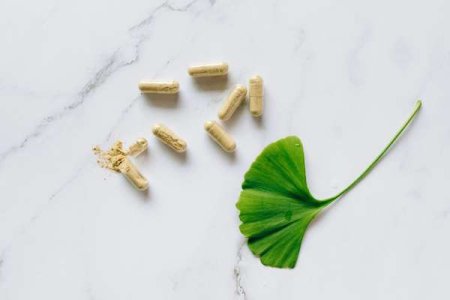Unlock the Secret to Brain Health with This Inexpensive Asian Supermarket Miracle!
By
Danielle F.
- Replies 3
As we gracefully navigate the golden years, maintaining our health becomes more than a mere routine—it's a commitment to living life to the fullest. And while we often focus on physical and mental well-being, there's a crucial aspect of our health that deserves equal attention: cognitive function. It's the engine that powers our memory, focus, and ability to engage with the world around us. So, when we hear whispers of a natural remedy that could bolster our brain health, it's only natural that we lean in closer to listen.
Enter ginkgo biloba extract, a supplement that's been making waves in the health community and has earned the nickname 'brain herb'. This isn't just another health fad; it's a time-honoured remedy rooted in traditional Chinese medicine, and it's gaining traction as a potential ally in the fight against cognitive decline, particularly dementia and Alzheimer's disease.

Ginkgo biloba extract comes from the dried leaves of the ginkgo biloba tree, an ancient species native to East Asia. This tree is a living fossil, with a lineage that stretches back over 270 million years. It's no wonder that the extract derived from it is thought to have some impressive health benefits.
The 'brain herb' has been a staple in traditional Chinese medicine for centuries, used to treat a variety of ailments. But it's the modern understanding that regular dosages may enhance cognitive function and memory that has caught the attention of ageing adults worldwide. According to registered dietitian and nutritionist Krutika Nanavati, ginkgo biloba extract may increase blood flow to the brain and improve brain functions like focus and memory in older individuals.
The science behind ginkgo biloba is fascinating. The extract is rich in terpenoids, flavonoids, polyphenols, and organic acids—compounds known for their anti-inflammatory, antioxidant, and neuroprotective properties. These compounds work together to improve blood flow to the brain and reduce oxidative stress, which can help balance the levels of free radicals and antioxidants in the body. This balance is crucial because an excess of free radicals is associated with the development and progression of neurodegenerative diseases like dementia.
Recent research, including an analysis of 15 clinical trials, has highlighted one particular formulation of ginkgo extract, known as EGb 761, for its effectiveness in combating symptoms of Alzheimer's and dementia. This formulation, which contains 24 percent flavonoid glycosides and 6 percent terpene lactones, showed promise in improving cognition, neuropsychiatric symptoms, and function in dementia patients in the majority of the studies analysed.
Before you rush to your nearest Asian supermarket or online retailer to stock up on this 'miracle' supplement, there are a few things to consider. While ginkgo is widely used in Europe and the United States, the Therapeutic Goods Administration in Australia is still working to determine the quality standards for ginkgo extracts used in medicines.
The recommended dosage of ginkgo biloba varies depending on the condition being targeted, and it's important to be aware of potential side effects, which can include upset stomach, headaches, dizziness, allergic skin reactions, and heart palpitations. Ginkgo may also interact with other prescription medications or supplements, so it's not advised for children, pregnant or breastfeeding women, or people living with epilepsy due to an association with causing seizures.
As with any new supplement or medication, it's crucial to consult with your doctor before adding ginkgo biloba to your regimen. Your healthcare provider can help you understand how ginkgo might fit into your overall health plan and whether it's a suitable option for you.
At the Seniors Discount Club, we're always on the lookout for ways to support our members in living their best lives. Ginkgo biloba extract could be a valuable tool in your health arsenal, but it's essential to approach it with the same care and consideration you would for any health-related decision.

Have you or someone you know tried ginkgo biloba for cognitive health? We'd love to hear about your experiences and any benefits you've noticed. Share your stories in the comments below, and let's continue the conversation about maintaining brain health as we age.
Enter ginkgo biloba extract, a supplement that's been making waves in the health community and has earned the nickname 'brain herb'. This isn't just another health fad; it's a time-honoured remedy rooted in traditional Chinese medicine, and it's gaining traction as a potential ally in the fight against cognitive decline, particularly dementia and Alzheimer's disease.

Ginkgo biloba has been present in East Asian medicine for its health benefits. Image Credit: Pexels/Nataliya Vaitkevich
Ginkgo biloba extract comes from the dried leaves of the ginkgo biloba tree, an ancient species native to East Asia. This tree is a living fossil, with a lineage that stretches back over 270 million years. It's no wonder that the extract derived from it is thought to have some impressive health benefits.
The 'brain herb' has been a staple in traditional Chinese medicine for centuries, used to treat a variety of ailments. But it's the modern understanding that regular dosages may enhance cognitive function and memory that has caught the attention of ageing adults worldwide. According to registered dietitian and nutritionist Krutika Nanavati, ginkgo biloba extract may increase blood flow to the brain and improve brain functions like focus and memory in older individuals.
The science behind ginkgo biloba is fascinating. The extract is rich in terpenoids, flavonoids, polyphenols, and organic acids—compounds known for their anti-inflammatory, antioxidant, and neuroprotective properties. These compounds work together to improve blood flow to the brain and reduce oxidative stress, which can help balance the levels of free radicals and antioxidants in the body. This balance is crucial because an excess of free radicals is associated with the development and progression of neurodegenerative diseases like dementia.
Recent research, including an analysis of 15 clinical trials, has highlighted one particular formulation of ginkgo extract, known as EGb 761, for its effectiveness in combating symptoms of Alzheimer's and dementia. This formulation, which contains 24 percent flavonoid glycosides and 6 percent terpene lactones, showed promise in improving cognition, neuropsychiatric symptoms, and function in dementia patients in the majority of the studies analysed.
Before you rush to your nearest Asian supermarket or online retailer to stock up on this 'miracle' supplement, there are a few things to consider. While ginkgo is widely used in Europe and the United States, the Therapeutic Goods Administration in Australia is still working to determine the quality standards for ginkgo extracts used in medicines.
The recommended dosage of ginkgo biloba varies depending on the condition being targeted, and it's important to be aware of potential side effects, which can include upset stomach, headaches, dizziness, allergic skin reactions, and heart palpitations. Ginkgo may also interact with other prescription medications or supplements, so it's not advised for children, pregnant or breastfeeding women, or people living with epilepsy due to an association with causing seizures.
As with any new supplement or medication, it's crucial to consult with your doctor before adding ginkgo biloba to your regimen. Your healthcare provider can help you understand how ginkgo might fit into your overall health plan and whether it's a suitable option for you.
At the Seniors Discount Club, we're always on the lookout for ways to support our members in living their best lives. Ginkgo biloba extract could be a valuable tool in your health arsenal, but it's essential to approach it with the same care and consideration you would for any health-related decision.
Key Takeaways
- Ginkgo biloba extract, referred to as the 'brain herb', is gaining attention as a potential aid in delaying dementia and Alzheimer's symptoms due to its neuroprotective properties.
- Derived from the ginkgo biloba tree, this plant-based supplement has been popular in traditional Chinese medicine and may improve cognitive function and memory through increased blood flow to the brain and reducing oxidative stress.
- Recent research involving 15 clinical trials suggests the specific ginkgo extract formulation EGb 761 may benefit dementia patients, with most studies showing an improvement in cognition, neuropsychiatric symptoms, and function.
- While ginkgo is commonly used in Europe and the USA, its usage and quality standards are currently being reviewed by Australia's Therapeutic Goods Administration, and there are potential side effects and interactions with other medications to consider before usage.







